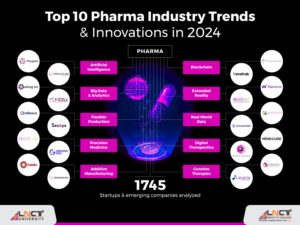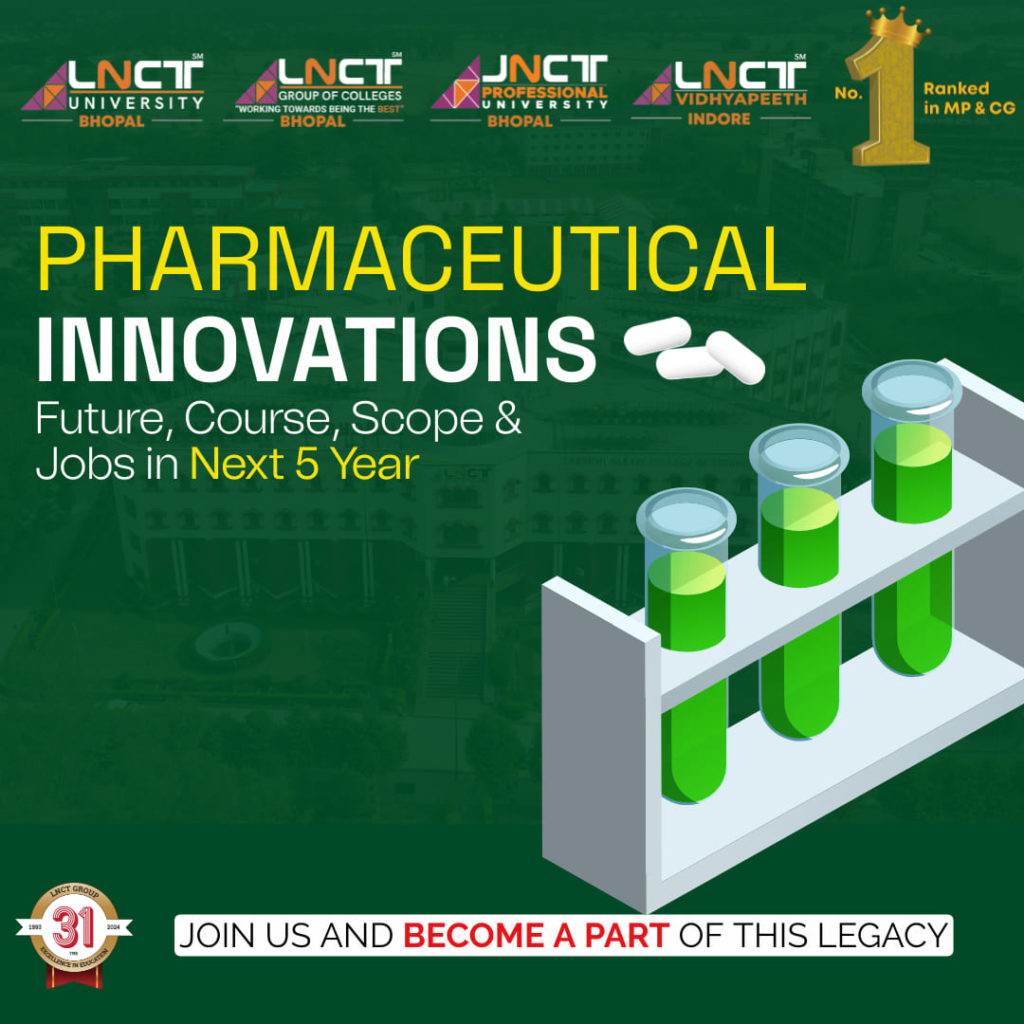Index
- Introduction
- Overview of the Pharmaceutical Industry
- Emerging Trends and Future of Pharmaceutical Innovations
- Pharmaceutical Education and Career Paths
- Job Opportunities and Roles in Pharmaceutical Innovations
- Conclusion
Introduction:
The pharmaceutical industry is a dynamic and rapidly evolving field that plays a critical role in improving global healthcare. Each year brings new advancements, breakthroughs, and opportunities that shape the future of pharmaceutical innovations. As we venture into the year 2023-24, it is crucial to explore the course, scope, and job prospects within this exciting industry.
We will delve into the educational pathways and career opportunities available for those aspiring to make a mark in this dynamic field. We will dive into the future of pharmaceutical innovations, exploring breakthrough technologies and their potential impact on drug discovery, precision medicine, and personalized treatments. We will unravel the exciting prospects offered by advancements in gene therapy, artificial intelligence, digital therapeutics, and more.
Within the vast realm of pharmaceutical innovations, certain therapeutic areas are at the forefront of progress. We will examine the groundbreaking developments in areas such as cancer treatment through immunotherapy, personalized treatments for neurodegenerative diseases, and advancements in rare diseases and orphan drugs. By exploring these areas, we gain insight into the direction of future research and healthcare advancements.
Education and career paths play a vital role in the pharmaceutical industry. From the educational options to importance, we will delve into various career paths available, ranging from research and development to clinical trials, regulatory affairs, data analytics, and marketing. Understanding these career opportunities will help individuals navigate their professional journey within the pharmaceutical sector.
While the future of pharmaceutical innovations is bright, it is essential to consider the challenges and ethical considerations that accompany progress. We will address ethical concerns related to research and development, pricing and accessibility of innovative therapies, regulatory challenges, and intellectual property rights. By exploring these aspects, we can ensure a balanced perspective on the industry’s growth and impact.
Additionally, we will take a global perspective, examining the pharmaceutical innovations and opportunities in different regions. From the research hubs of North America and Europe to the emerging markets of Asia, understanding the global landscape provides valuable insights into collaboration, market trends, and international partnerships.
In conclusion, the world of pharmaceutical innovations in 2023-24 is filled with immense potential and exciting possibilities. By staying informed about the latest trends, educational pathways, and career opportunities, you can position yourself for success in this dynamic industry. Join us as we explore the future of pharmaceutical innovations and uncover the fascinating world of healthcare advancements. Let’s embark on this journey together!

Overview of the Pharmaceutical Industry:
The pharmaceutical industry is a dynamic and vibrant field that holds the power to transform lives for good through groundbreaking innovations.
We will delve into the intricate web of scientific research, clinical trials, regulatory frameworks, and patient care that collectively shape the course of pharmaceutical innovation.
Furthermore, pharmaceutical companies invest heavily in research and development, driving scientific exploration to discover new molecules, enhance existing drugs, and pioneer breakthrough technologies.
Pharmaceutical innovation encompasses a wide range of disciplines and specialties. Strict regulations and rigorous approval processes are in place to safeguard public health. These measures help maintain high standards of pharmaceutical innovation while ensuring that medications meet stringent criteria for safety, effectiveness, and manufacturing practices.
Pharmaceutical innovation also extends to areas such as drug delivery systems, formulation technologies, medical devices, and digital health solutions. These advancements aim to enhance drug efficacy, improve patient compliance, and enable personalized treatment approaches tailored to individual needs.
As the pharmaceutical industry advances, it faces various challenges and opportunities. Access to affordable healthcare, intellectual property rights, pricing and reimbursement issues, and global health inequalities are among the complex factors that demand attention and thoughtful solutions. Ethical considerations and responsible practices are vital to ensure that pharmaceutical innovations are accessible, equitable, and aligned with patient needs.
Pharmaceutical innovation combines scientific prowess, technological advancements, and regulatory expertise to deliver life-changing treatments and therapies and it continues to shape the future of healthcare, offering hope and improved outcomes for patients around the world.
Emerging Trends and Future of Pharmaceutical Innovations:
The future of pharmaceutical innovations is a captivating landscape filled with exciting advancements and transformative possibilities.
One of the most promising areas driving pharmaceutical innovation is the convergence of technology and healthcare.
Another fascinating trend in pharmaceutical innovation is the rise of precision medicine and personalized treatments. This personalized approach allows for tailored treatments that are more effective and have fewer side effects.
Gene therapy involves modifying or replacing faulty genes to correct genetic disorders or prevent the progression of diseases. This emerging field offers hope for conditions that were previously considered incurable, potentially revolutionizing the treatment of genetic disorders and certain types of cancers.
Digital therapeutics and connected healthcare technologies are also shaping the future of pharmaceutical innovations. These innovations leverage mobile apps, wearables, and digital platforms to deliver therapies and interventions that complement traditional medications.
The convergence of technologies, precision medicine, gene therapy, and digital interventions will likely pave the way for more targeted, effective, and personalized treatments. Pharmaceutical innovation is on an exciting trajectory, constantly pushing the boundaries of what is possible in healthcare.
The future of pharmaceutical innovations holds immense promise and potential. Advancements in technology, precision medicine, gene therapy, digital therapeutics, and regenerative medicine are reshaping the landscape of healthcare. These emerging trends have the power to revolutionize patient care, offering more precise, personalized, and effective treatments.
Pharmaceutical Education and Career Paths
Education plays a pivotal role in preparing individuals for success in the pharmaceutical industry. There are several educational options available, ranging from undergraduate degrees to advanced graduate programs. Pursuing a bachelor’s degree in pharmaceutical sciences, chemistry, biology, or a related field provides a solid foundation of knowledge in the scientific principles and concepts that underpin the pharmaceutical industry.
For those seeking to specialize further, pursuing a master’s degree or a doctoral degree (Ph.D.) in pharmaceutical sciences or a related discipline opens doors to advanced research, leadership roles, and specialized career opportunities. These programs delve deeper into areas such as drug discovery, pharmacology, pharmacokinetics, clinical research, regulatory affairs, and pharmaceutical marketing.
In addition to formal education, acquiring practical experience through internships, co-op programs, or research opportunities can greatly enhance your skill set and make you more competitive in the job market.
Interdisciplinary skills are increasingly valuable in the pharmaceutical industry. Collaborative work environments often require professionals with a range of abilities, including strong communication, critical thinking, problem-solving, and leadership skills. Developing these skills alongside your scientific knowledge can give you a competitive edge and open up diverse career pathways within the pharmaceutical sector.
Career paths in the pharmaceutical industry are varied and encompass a wide range of roles and responsibilities. One prominent area is research and development (R&D), where scientists and researchers drive innovation by exploring new drug targets, conducting preclinical and clinical trials, and contributing to the development of safe and effective pharmaceutical products.
Clinical research and regulatory affairs are integral to the pharmaceutical industry. Professionals in these fields play a crucial role in navigating complex regulatory landscapes and ensuring that drugs reach the market efficiently while maintaining patient safety.
The field of data analytics and bioinformatics has gained significant importance in recent years. Pharmaceutical companies rely on data-driven insights to inform decision-making, optimize drug development processes, and improve patient outcomes. Professionals skilled in data analysis, bioinformatics, and computational biology are in high demand to extract meaningful insights from large datasets and contribute to evidence-based decision-making.
Pharmaceutical marketing and sales are vital components of the industry. Professionals in this area are responsible for promoting pharmaceutical products, building relationships with healthcare professionals, and ensuring that products reach the intended target audience. This field requires a blend of scientific knowledge, marketing acumen, and excellent communication skills.
It’s worth noting that the pharmaceutical industry offers global opportunities. As healthcare is a universal concern, professionals have the potential to contribute to pharmaceutical innovations and advancements on an international scale. Collaboration with international research institutions, participation in global clinical trials, and engagement with diverse healthcare systems provide avenues for professionals to make a global impact.
In conclusion, pharmaceutical education opens doors to a multitude of exciting career paths within the industry. Whether you’re passionate about scientific research, clinical trials, regulatory affairs, data analytics, or marketing, the pharmaceutical field offers diverse opportunities to make a difference in healthcare.

Job Opportunities and Roles in Pharmaceutical Innovations:
The field of pharmaceutical innovations presents a myriad of enticing job opportunities, each contributing to the advancement of healthcare and the development of life-changing treatments. From medicinal chemists designing new molecules to biologists investigating disease mechanisms, these professionals contribute to the discovery and development of safe and effective pharmaceutical products.
Clinical research is another pivotal area within pharmaceutical innovations. Clinical research professionals oversee and manage clinical trials, ensuring compliance with regulatory requirements, ethical guidelines, and patient safety standards.
Regulatory affairs professionals are responsible for navigating the complex web of regulations and guidelines that govern the pharmaceutical industry. They ensure that pharmaceutical products meet stringent regulatory requirements, facilitate the approval process, and maintain compliance throughout a product’s lifecycle. These professionals work closely with regulatory agencies, providing expertise and ensuring adherence to quality, safety, and efficacy standards.
The field of data analytics and bioinformatics has witnessed tremendous growth and offers promising career paths within pharmaceutical innovations. Their expertise contributes to informed decision-making, optimization of drug development processes, and identification of new opportunities for innovation and improvement.
Medical affairs professionals collaborate with key opinion leaders, healthcare professionals, and patient advocacy groups to disseminate scientific information, ensure the appropriate use of pharmaceutical products, and provide medical expertise and support. Medical affairs roles encompass medical science liaisons, medical writers, and medical affairs managers.
Quality assurance and quality control professionals are essential in ensuring that pharmaceutical products meet rigorous quality standards. They establish and maintain quality systems, conduct inspections, and implement procedures to guarantee product safety and consistency. Their meticulous attention to detail and adherence to regulations contribute to the production of high-quality pharmaceuticals that patients can trust.
Pharmaceutical marketing and sales professionals play a pivotal role in introducing pharmaceutical products to the market, building brand awareness, and engaging with healthcare professionals. These individuals possess a combination of scientific knowledge, marketing acumen, and excellent communication skills. They work closely with research and development teams to understand product benefits, develop marketing strategies, and foster relationships with healthcare providers to ensure the appropriate use of pharmaceutical innovations.
In addition to these core roles, the pharmaceutical industry offers a wide range of supporting functions. These include regulatory writing, pharmacovigilance and drug safety, supply chain management, project management, and business development. Each of these roles contributes to the overall success of pharmaceutical innovations by ensuring compliance, safety, efficiency, and strategic growth.
The field of pharmaceutical innovations presents a diverse array of job opportunities for professionals seeking to make a difference in healthcare. Whether you’re a scientist at the forefront of drug discovery, a regulatory affairs expert ensuring compliance, or a marketing professional promoting innovative treatments, your contributions are essential in advancing pharmaceutical innovations and improving patient outcomes. Embrace the exciting possibilities and embark on a rewarding career that merges your passion for healthcare with the dynamic world of pharmaceutical innovations.

Conclusion:
In conclusion, the world of pharmaceutical innovations is a captivating realm that holds immense promise for the future of healthcare. From breakthrough technologies and personalized treatments to gene therapy and digital health solutions, the potential for advancements is truly awe-inspiring. The pharmaceutical industry continues to push boundaries, forging new paths toward better prevention, diagnosis, and treatment of diseases.
Whether you’re drawn to the world of research and development, clinical trials, regulatory affairs, data analytics, or marketing, the pharmaceutical industry offers avenues to contribute meaningfully to the advancement of healthcare.
By working together, sharing knowledge, and embracing diversity, professionals in pharmaceutical innovations can accelerate progress and bring innovative therapies to those in need.
While challenges exist, such as ethical considerations, pricing concerns, and regulatory complexities, it is imperative to address them with a steadfast commitment to patient safety, accessibility, and ethical practices. By doing so, we can ensure that pharmaceutical innovations benefit individuals from all walks of life, making healthcare more equitable and accessible.
As we look toward the future, the potential for pharmaceutical innovations is boundless. The discoveries yet to be made, the breakthroughs yet to be achieved, and the lives yet to be transformed present an exciting horizon for professionals in this field.
Embrace the opportunities, contribute your unique skills, and become part of a community that is dedicated to pushing the boundaries of healthcare possibilities.


